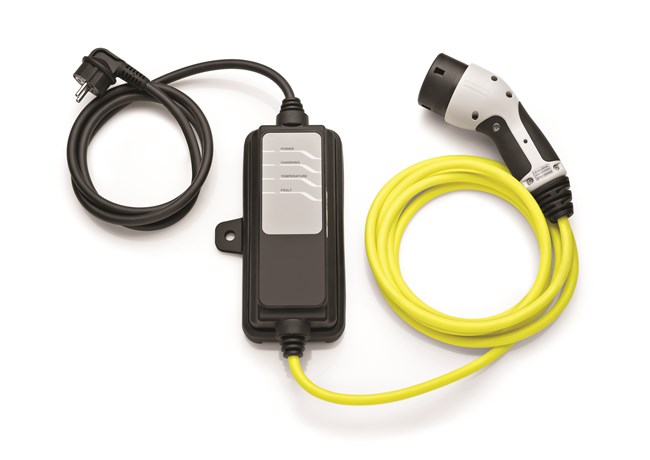- Tyres: The path of least resistance
- ETRUX receives Ford Pro Convertor status
- The Logistics Organisation adds to van fleet with Vanaways
- Northgate launches micromobility service
- Progress being made on shared EV charging, AFP reports
- Medisort electrifying van fleet with Bedeo
- ADVERTISEMENT FEATURE: Taking a shortcut to reduce commercial vehicle emissions
- The What Van? Road Test: Ford Ranger Raptor
- Speakers announced for Commercial Vehicle Show
- Check new vehicle registration details are correct, AFP tells fleets
Electric van grants reduced by UK Government
Date: Wednesday, December 15, 2021 | Author: Sean Keywood

The UK Government has cut the level of grant support available with new electric vans.
From today, the plug-in vehicle grant scheme payments for large van purchases (2.5t-3.5t) has been reduced from £8,000 to £5,000, while the grants for small vans (less than 2.5t) are down from £3,000 to £2,500, with a new limit also being introduced of 1,000 grants per customer per year.
The government has also announced that the maximum grant with a new electric car has been reduced from £2,500 to £1,500, while the maximum price of cars to which the grant can be applied has also been dropped, from £35,000 to £32,000. Wheelchair-accessible vehicles are unaffected by the change.
It is the second time this year the grants have been reduced, having been set at their previous level in March.
Commenting on the changes, Transport Minister Trudy Harrison said: “The market is charging ahead in the switch to electric vehicles. This, together with the increasing choice of new vehicles and growing demand from customers, means that we are refocusing our vehicle grants on the more affordable vehicles and reducing grant rates to allow more people to benefit, and enable taxpayers’ money to go further.
“We want as many people as possible to be able to make the switch to an electric vehicle, which is why we will also be introducing new rules to make it easier to find and pay at charge points.
“This will ensure drivers have confidence in our charging infrastructure, as we look to reduce our carbon emissions, create green jobs and level up right across the UK.”
Reacting to the announcements, Society of Motor Manufacturers and Traders chief executive Mike Hawes said: “Slashing the grants for electric vehicles once again is a blow to customers looking to make the switch and couldn’t come at a worse time, with inflation at a ten-year high and pandemic-related economic uncertainty looming large.
“Industry and government ambition for decarbonised road transport is high, and manufacturers are delivering ever more products with ever better performance. But we need to move the market even faster – from one in a hundred cars on the road being electric, to potentially one in three in just eight years – which means we should be doubling down on incentives.
“Other global markets are already doing so whereas we are cutting, expecting the industry to subsidise the transition, and putting up prices for customers. UK drivers risk being left behind on the transition to zero-emission motoring.”
Giving his reaction, BVRLA chief executive Gerry Keaney said he was particularly concerned about the reduced electric van grants.
He said: “Financial incentives such as the plug-in grants have proven to be a positive factor in encouraging people into electric vehicles, evidenced by the continued growth we’re seeing. Subsidies cannot run forever, but the fleet sector relies on certainty, reducing these grants will have a negative impact on this.
“While we’ve seen high levels of uptake within the car market, the situation is not the same for electric vans. The disparity across the industry means that sweeping solutions are not suitable.
“Incentives have had a positive impact to date but there is more to be done. It is disappointing to see support declining when cost remains a crucial stumbling block.”
Keaney said there remained many barriers to electric van adoption, and that the government’s announcement would increase these and delay uptake.
He added: “This is particularly the case for SMEs, where the lack of price parity between ICE vehicles and electric alternatives makes it hard to create a realistic business case to make the switch.
“For the move towards electric vans to gain momentum, more support and incentives are essential, now is not the time to remove or reduce them.
“We are calling on the government to provide more support around commercial vehicles, including an extension of the plug-in van grant beyond the current 2022/2023 end date.”
Jon Lawes, managing director of leasing company Hitachi Capital Vehicle Solutions, said: “Last minute cuts to both the grants for cars and vans are counter intuitive to achieving the ambitious targets set by the government to reduce carbon emissions and has the potential to dampen the strong demand for zero-emission vehicles we’ve seen in recent months.
“Despite the growth of EV registrations, this market remains in its infancy and TCO, especially across LCVs, can be challenging for fleet operators who need to adopt.
“The government rationale to reducing eligibility at this juncture for the second time this year is confusing, as we know financial incentives to encourage EV adoption are an important factor within the vehicle renewal decision making process.”
View The WhatVan Digital Edition


